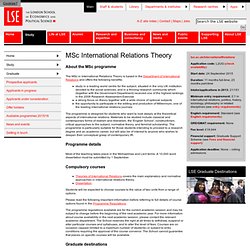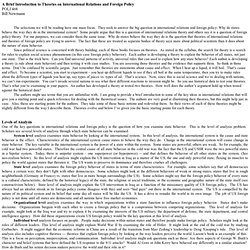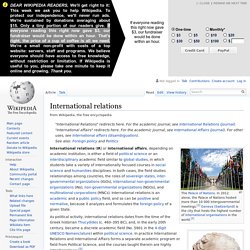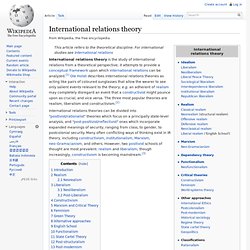

MSc International Relations Theory - Taught Programmes 2013 - Graduate - Study. About the MSc programme The MSc in International Relations Theory is based in the Department of International Relations| and offers the following benefits: study in a leading world centre for the subject, situated in the only UK institution devoted to the social sciences, and in a thriving research community which (together with the Government Department) received one of the highest rankings in the 2008 Research Assessment Exercise a strong focus on theory together with a wide choice of optional subjects the opportunity to participate in the editing and production of Millennium, one of the leading international relations journals The programme is designed for students who want to look deeply at the theoretical aspects of international relations.

Materials to be studied include classical and contemporary forms of realism and liberalism, the 'English School', constructivism, critical approaches to the subject, normative theory, and feminist scholarship. Programme details. International Relations Theory. A Brief Introduction to Theories on International Relations and Foreign Policy. A Brief Introduction to Theories on International Relations and Foreign Policy Bill Newmann The selections we will be reading have one main focus.

They seek to answer the big question in international relations and foreign policy: Why do states behave the way they do in the international system? Some people argue that this is a question of international relations theory and others say it is a question of foreign policy theory. For our purposes, we can consider them the same issue. Since political science is concerned with theory building, each of these books focuses on theories. The authors might use terms that you are unfamiliar with. Levels of Analysis One of the key questions in international relations and foreign policy is the question of how you examine state behavior. System level analysis examines state behavior by looking at the international system. International relations.
The field of international relations dates from the time of the Greek historian Thucydides.

As political activity, international relations dates from the time of the Greek historian Thucydides (c. 460–395 BC), and, in the early 20th century, became a discrete academic field (No. 5901 in the 4-digit UNESCO Nomenclature) within political science. In practice International Relations and International Affairs forms a separate academic program or field from Political Science, and the courses taught therein are highly interdisciplinary.[3] For example, international relations draws from the fields of: technology and engineering, economics, history, and international law, philosophy, geography, social work, sociology, anthropology, criminology, psychology, gender studies, cultural studies, culturology, diplomacy.
History[edit] The centuries of roughly 1500 to 1789 saw the rise of the independent, sovereign states, the institutionalization of diplomacy and armies. Study of IR[edit] Theory[edit] International relations theory. This article refers to the theoretical discipline.

For international studies see International relations Introduction[edit] The study of International relations as theory can be traced to E.H. Carr's The Twenty Years' Crisis which was published in 1939 and to Hans Morgenthau's Politics Among Nations published in 1948.[4] International relations as a discipline is believed to have emerged after the First World War with the establishment of a Chair of International Relations at the University of Wales, Aberystwyth.[5] Early international relations scholarship in the Interwar years focused on the need for the balance of power system to be replaced with a system of collective security. These thinkers were later described as "Idealists".[6] The leading critique of this school of thinking was the "realist" analysis offered by Carr.
Explanatory and constitutive approaches in international relations theory is a distinction made when classifying international relations theories. Realism[edit] International Politics: Theories of International Relations. A theory of international relations is a set of ideas that explains how the international system works.

Unlike an ideology, a theory of international relations is (at least in principle) backed up with concrete evidence. The two major theories of international relations are realism and liberalism. Realism According to realism, states work only to increase their own power relative to that of other states. Realism also claims the following: The world is a harsh and dangerous place. Politicians have practiced realism as long as states have existed. Liberalism. The IR Theory Home Page.